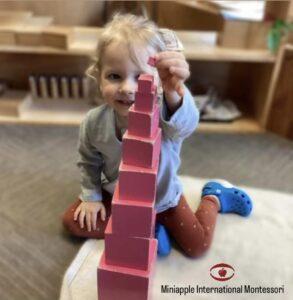 Preschool represents a foundational stepping stone in a child’s educational journey. Parents often find themselves navigating an array of learning approaches, each promising a developmental advantage. Among these, hands-on learning activities stand out for their profound impact on early childhood education. When children engage in interactive and tactile experiences, it fosters cognitive, social, and emotional growth. In this blog, we delve into why hands-on learning is crucial for preschoolers and how it can set the stage for lifelong learning success.
Preschool represents a foundational stepping stone in a child’s educational journey. Parents often find themselves navigating an array of learning approaches, each promising a developmental advantage. Among these, hands-on learning activities stand out for their profound impact on early childhood education. When children engage in interactive and tactile experiences, it fosters cognitive, social, and emotional growth. In this blog, we delve into why hands-on learning is crucial for preschoolers and how it can set the stage for lifelong learning success.
Cognitive Development through Hands-on Learning
Cognitive development in early childhood is a complex process that hands-on activities effectively facilitate. Preschoolers are naturally curious and inclined to explore the world with their senses. When they participate in activities that engage their hands and minds simultaneously, such as building the Pink Tower, tracing sandpaper letters, painting, or matching sound cylinders, they develop crucial problem-solving skills. This type of engagement encourages children to think critically, analyze situations, and come up with creative solutions.
By manipulating physical objects, young children also enhance their understanding of concepts that are often abstract. For instance, learning about shapes, sizes, and spatial relationships becomes more tangible when children can touch, move, and experiment with different objects. This hands-on approach aids in developing fine motor skills, hand-eye coordination, and muscle memory, all of which are essential for more complex tasks they will encounter later in their education.
Social and Emotional Benefits of Interactive Learning
Preschool is not just about intellectual growth; it is also a critical period for social and emotional development. Hands-on learning activities provide an ideal platform for children to interact with peers and learn to share, cooperate, and resolve conflicts. These social skills are indispensable for their future schooling and personal life.
During collaborative activities, such as group projects, partner work or team-based experiments, children practice communication and teamwork. They learn to express their thoughts and listen to others, which are key components of effective communication. Moreover, the sense of achievement that comes from creating something with their own hands can boost a child’s confidence, fostering a positive self-image and resilience.
Emotional regulation is another significant benefit. Engaging in hands-on activities allows children to express their emotions in a controlled and healthy manner. For example, pouring water, washing dishes, or tracing numbers in sand can be a calming activity that helps reduce anxiety and stress. As they navigate the ups and downs of these interactive experiences, children become better equipped to handle their emotions, a skill that will serve them well throughout their lives.
Practical Application of Knowledge
One of the most compelling advantages of hands-on learning in preschool is its ability to bridge the gap between theory and practice. Young children often struggle to understand abstract concepts without concrete examples. Hands-on activities provide the practical application needed to solidify these concepts in their minds.
For instance, a simple gardening project can teach children about plant biology, photosynthesis, and the environment. As they plant seeds, water them, and observe their growth, they begin to understand the life cycle of plants in a way that reading a textbook cannot replicate. Similarly, cooking activities can introduce basic math skills, such as counting, measuring, and following sequences. These practical experiences make learning more relatable and enjoyable for preschoolers, enhancing their overall educational experience.
Encouraging Lifelong Learning
By engaging in hands-on learning activities, preschool children cultivate a love for learning that can last a lifetime. These activities are not only educational but also fun and engaging, helping to instill a positive attitude towards education from an early age. A child who enjoys learning is more likely to remain curious and motivated throughout their academic journey and beyond.
Moreover, hands-on learning promotes independent thinking. Children learn to ask questions, seek out answers, and explore new ideas on their own. This independence is crucial for their future academic success and personal growth. When children are given the tools and opportunities to learn by doing, they develop into autonomous learners who take charge of their education.
Hands-on learning activities play an indispensable role in preschool education. As parents, recognizing the importance of hands-on learning can guide you in choosing the best preschool environment for your child, setting them on a path of continued success and discovery. Contact us at the Miniapple International Montessori School to learn more about a hands-on learning approach for preschoolers.

